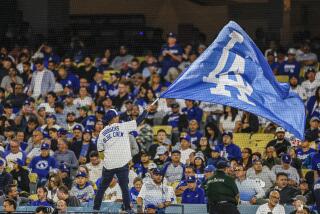MAJOR LEAGUE BASEBALL: THE LOCKOUT AFTERMATH : Vincent Offers a Plan to Play All 162 Games : Schedule: Playoffs would be delayed for postponed games. CBS indicates it will cooperate.
- Share via
Commissioner Fay Vincent said Monday that he is “reasonably confident” that baseball will be able to scratch the asterisk that would always accompany a 158-game season.
“I think we’re going to be able to preserve a 162-game season,” Vincent said by phone from his New York office.
The season had been scheduled to begin April 2. But after Sunday night’s collective bargaining agreement, ending the owners’ 32-day spring training lockout, Vincent had announced that the season would not begin until April 9 and that the tentative plan was to play 158 games, with both the union and management still considering ways to play all 162.
The route settled on was to ask CBS, which holds television rights to the playoffs and World Series, if it would agree to a three- or four-day delay in the start of postseason play so that the four postponed games could be made up after the season is scheduled to end on Sept. 30.
A CBS spokeswoman said Monday that the network does not have a scheduling conflict in that period and is willing to cooperate with the commissioner’s office.
Deputy Commissioner Steve Greenberg said he thought a decision would be made today and was hopeful the season could be extended.
Otherwise, he said, it is unlikely the games can be made up, since each team is already using days off and doubleheaders to make up three of the first week’s postponed games.
“I don’t know that there’s room for doubleheaders and I don’t think anyone wants them because of the implication to pitching staffs and travel time,” Greenberg said, suggesting that the Major League Players Assn. would not approve a rescheduling in that fashion.
Greenberg clarified two other aspects of the four-year agreement that were not detailed when the deal was announced at a New York news conference that began Monday morning at 1:15 EST:
--Teams will be allowed to carry 27 players for the first three weeks. They must then cut to 24, but from 1991 through expansion, they can carry 25. It had been suggested the teams be allowed to carry 30 through the first month of the 1990 season, but that plan, Greenberg said, was tied to a two-week training camp. The union insisted on three weeks.
--The new agreement deals with expansion only to the extent of what was already known. The National League will announce an expansion timetable within 90 days of Monday, when the agreement was signed. Greenberg said reports that the agreement guaranteed the addition of six new teams by the end of the decade were inaccurate. Those reports stemmed from information supplied by management sources, but Greenberg said that expansion to 32 teams was never part of the proposal leading to Sunday’s settlement.
The agreement covers the 1990, ‘91, ’92 and ’93 seasons, but each side can reopen negotiations on any key economic issue, such as free agency, arbitration and minimum salary after the 1992 season.
Greenberg laughed, however, as he reflected on the four months that were required to complete the new agreement.
“After what we’ve just gone through, I don’t think either side would reopen negotiations frivolously,” he said. “They would have to perceive a situation as being desperate or intolerable. And even then, why negotiate a procedure that would be in effect for only a year (1993) before it would have to be renegotiated?”
The right to reopen, Greenberg said, was included on the clubs’ insistence in case their most pessimistic reports regarding economic problems become reality in two or three years.
“This would then provide a way for the clubs to get out of that situation,” Greenberg said.
But a more important aspect, he added, is that the agreement creates a joint study commission on revenue sharing and the industry’s economics. Details of how that committee will be selected are still being worked on, Greenberg said, but it will be a blue-ribbon panel with no previous ties to baseball or the union.
“Theoretically, they will determine one of three things,” Greenberg said. “Everything is fantastic (with baseball’s economics), the doomsayers are right or, as I suspect, it’s somewhere in between. More importantly, it’s a legitimate chance for the union and clubs to work together, the basis for a better relationship.”
The negotiations of this winter seemed to do little toward building that relationship. At times, they were more bitter than better, but the tone Monday was conciliatory.
Gene Orza, the union’s associate general counsel, refused to claim that his side had won, as the evidence indicates. He said neither side is completely satisfied, an indication that the process worked. Now, he added, the sides must recognize the need to endure compatibly through the administration of the agreement, as they did in the negotiation of it.
“It’s like a marriage,” Orza said. “We have our arguments, but we wake up the next morning and we’re still living in the same house.”
The important thing, he said, is that the clubs have to realize that they can’t continually wage war over player control--unilaterally setting wages and attempting to control movement. “We can discuss scheduling, per diem and the pension, but player control is just not a legitimate issue, yet it leads to most of the problems,” Orza said.
It is generally agreed that Greenberg, a former player agent trusted by Don Fehr, the union’s executive director, has given management a new feel for union thinking and sensitivity, and that he played a significant role in the negotiations, a source of ideas and liaison to Fehr at the darkest moments.
“I think my relationship with Don did add something,” Greenberg said. “The ability of someone on our side to sit down with the head of the union in an atmosphere of mutual trust was invaluable and unprecedented.”
Although confronted by an ownership element that seemed to demand union blood and would not consider lifting of the lockout, Vincent also played a role, privately conferring with Fehr, keeping the parties at the table, providing a conciliatory atmosphere.
“We need time and distance to provide perspective, but I tried to be helpful and I think I was,” Vincent said, adding that, despite the limitations of his office, he is not concerned about the consequences of his actions. He drew praise for his handling of the earthquake-delayed World Series. The reaction to his role in the negotiations probably will be mixed.
“I’d like to think that I wouldn’t always be dealing with a crisis, but I’m not naive,” Vincent said. “I realize it comes with the territory. It’s a difficult job and I’ve tried to do my best and what’s best for baseball.”
More to Read
Go beyond the scoreboard
Get the latest on L.A.'s teams in the daily Sports Report newsletter.
You may occasionally receive promotional content from the Los Angeles Times.










